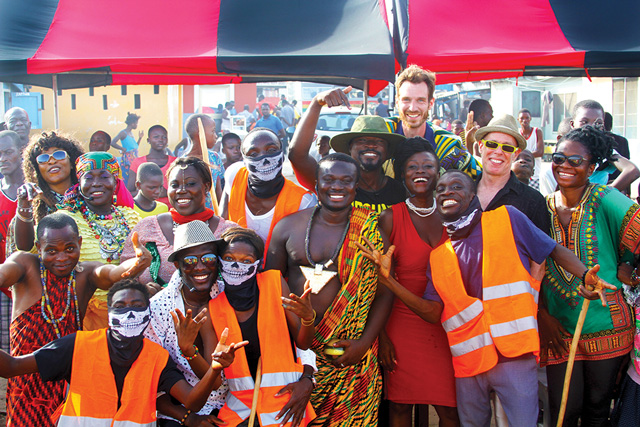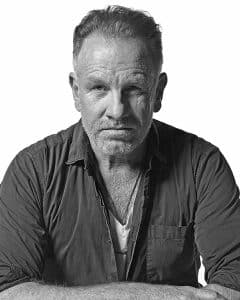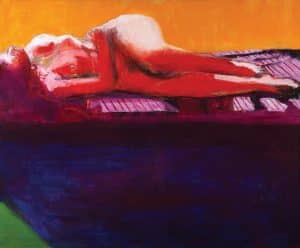Abena Takyi in Ten Blocks on the Camino Real, performed in Ghana.
by Rebecca M. Alvin
The Provincetown Tennessee Williams Theater Festival has brought us numerous productions of Williams’ Camino Real over the years—including both the full 1953 version and its predecessor, the one-act Ten Blocks on the Camino Real written in 1946. Noted for its exceedingly beautiful language, theatrical surrealism, and aching existentialism, it was envisioned as a kind of “Mexican fantasia.” The main character, an American G.I. named Kilroy spends time with figures from other worlds, such as Casanova, Don Quixote, and Lord Byron, while a cadre of street sweepers sweep the dead from the streets. It is decidedly different from the plays Williams had already had successes with by the time it was produced with Eli Wallach in the lead, directed by Elia Kazan. Even Kazan himself later said he misunderstood the play and directed it in the realist style to which he and audiences were then accustomed. In actuality, the play is a different sort of reality, one that is expressionistic and in some ways both more traditional and more avant garde for theater in 1950s America.
“There are some of the most beautiful speeches that Williams ever wrote in the full Camino Real —unbelievable, that I remember people weeping when we heard them, including me. But in Ten Blocks, because it’s smaller and because it’s tighter, there’s a real musicality to it from beginning to end,” says David Kaplan, artistic director for the Festival. It is also more clearly connected to Brechtian theater, he says, and it is more focused on its political context. For all of these reasons, among others, it will be presented this year again, this time through a production Kaplan directs with a theatrical troupe from Ghana. Though it may be surprising that a play by an American playwright with clear connections to neighboring Mexico would be interpreted by a West African nation, Kaplan say it is not as much of a stretch as one might imagine.
While flying home from directing a production of King Lear in Uzbekistan (in Uzbek) in 1997, Kaplan, sat next to the head of the Peace Corps in Uzbekistan, who suggested he should look into working in Ghana. He explained that he’d recently been there and seen bands of performers drive into a busy area, set up stages and entertain crowds every couple of weeks, including the performance of real, full-length plays. Kaplan was intrigued.

“I began doing the research on theater in Ghana, and I learned that they had a theater tradition that dated back to the early 1900s, that they had a cabaret tradition…and that they also had a thing called ‘concert party’ and that was this indigenous form of commedia,” complete with music, dance, and stock characters strikingly similar to commedia dell’arte.
Things were put on hold, but then about three years ago the subject of Ghanaian theater came up again when an actor Kaplan knew mentioned that he’d worked with the National Theater of Ghana. Kaplan had just done a production of Ten Blocks in Uruguay at an outdoor marketplace and was immediately drawn back to thinking about Ghana. The result is this year’s production of Ten Blocks on the Camino Real, featuring the Abibigroma, the resident drama company of the National Theater of Ghana directed by Kaplan. It is not only on the schedule for the Provincetown Tennessee Williams Theater Festival this year, but has been produced in Ghana and is currently touring several American cities.
Abena Takyi, a Ghanaian performer in Abibigroma who plays Marguerite in this production, explains the audience in Ghana was receptive to the play. “We performed it last year at different markets and it was super crowded…They received us well in Ghana, but I must admit they were a bit confused due to its nature,” she says.
“We use theater as a way to teach cultural, political, and society norms and ideals,” she says. “It’s an integral part of our heritage and so we use it to remember, reflect, and to teach the youth about the culture. And also to broaden our knowledge or other cultures.”
Confronted with the notion that Camino Real, in both its versions, is a somewhat experimental play for Tennessee Williams in his time, Kaplan balks. “I don’t know that I would use the word ‘experimental’ anymore. It is commedia, it’s carnival.” In this regard he says it is actually more closely connected to traditions all over the world (including Ghana) that aren’t as fixated on realism.
A fair point. But when first produced, it did surprise people used to Williams’ earlier plays, such as A Streetcar Named Desire and The Glass Menagerie. Brooks Atkinson of the New York Times described it as “a strange and disturbing drama… full of black and appalling images,” in his review of the original 1953 production. And it remains “a surrealist play in the real meaning of ’surrealism,’ which is an extension of reality,” says Kaplan.
Takyi agrees the play was not what she’d expected of Williams. “I and most of my theater group knew about Tennessee Williams’ more famous plays… So when David Kaplan came to us and introduced Ten Blocks, we were quite excited. A little confused as well because it was quite different from the plays we were used to,” she recalls.
Takyi says theater in Ghana grew out of old-fashioned storytelling around the fire, which she says still continues in homes in Ghana, although the influence of television and the Internet is undeniable. “We use theater as a way to teach cultural, political, and society norms and ideals,” she says. “It’s an integral part of our heritage and so we use it to remember, reflect, and to teach the youth about the culture. And also to broaden our knowledge or other cultures.”
Takyi is excited to bring the production to Provincetown, an effort that is sure to bring Ghanaian culture to audiences, as well as the work of Williams. Where the original Ten Blocks has elements of Mexican environment and Spanish language parts, this one will bring Ghana to us and we will hear several Ghanaian languages spoken, as well as sounds and music connected to Ghana.
Kaplan says he learned a great deal from first doing the production in the marketplace in Uruguay, including how to emphasize the episodic nature of it so that passersby could still get something from it if they were only able to stay for a portion of it. He also notes that this episodic structure demonstrates the influence of Ervin Piscator, a mentor to Bertoldt Brecht who also taught Williams when he studied at The New School. Bringing the Ghanaian concert party to Ten Blocks, according to Kaplan, was actually no stretch because it restored something to the play that was already there in Williams’ earliest conception of it. “You can do it Ghana, you can do it in Uruguay; it’s a pretty universal play. You know, you can track it back to Rome,” says Kaplan.
The Provincetown Tennessee Williams Theater Festival presents Ten Blocks on the Camino Real outside at the Bas Relief, 106 Bradford St. (rain location: Provincetown Town Hall) for five performances Thursday, September 21 through Sunday, September 24. For specific showtimes and tickets ($35/students $26.25) go to the box office at Sage Inn, 336 Commercial St., call 866.789.TENN, Ext. 1 or visit twptown.org.











